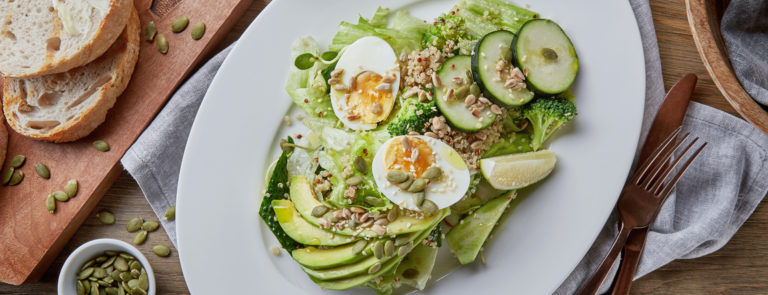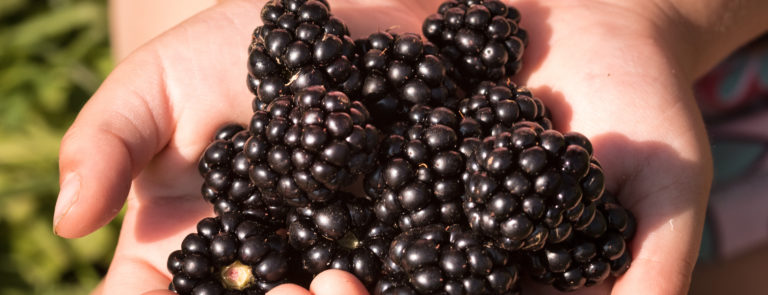A diet containing less meat is becoming more and more popular and there are currently over three million vegetarians in the UK today.
1
There are lots of reasons to cut down on your meat consumption, including reducing your carbon footprint, living a more sustainable lifestyle, avoiding eating animals as well as a wide number of health reasons.
2
In this article, we look at two common ‘low meat’ diets – vegetarianism and flexitarianism – and delve a little deeper to find out the benefits of each.
What is a vegetarian?
A vegetarian is someone who eats a diet which does not contain any meat or fish.
Unlike a vegan diet which is completely plant-based, vegetarians may still choose to eat dairy products, eggs and honey.
Why become a vegetarian?
There are many reasons why someone may choose to
become a vegetarian.
Thanks to the year round availability of fresh produce, more vegetarian options in restaurants and more influence from cultures with largely plant-based diets, vegetarianism has become more accessible, as well as more appealing.
3
Animal welfare
One of the main reasons is concern about animal welfare and a commitment to sustainability.
Compared to a diet which involves meat consumption, the emissions from vegetarian diets are around 50% lower.
5
Religious beliefs and health benefits
There are other reasons too, including religious beliefs and health.
5
Vegetarianism may provide a more balanced diet, with the inclusion of lots of plant-based foods such as grains, fruit, vegetables and pulses, which are packed full of nutrients, whilst also being free from saturated fats.
6
However, a vegetarian diet can be unhealthy if you do not plan your meals properly. It can sometimes be difficult to know how to add flavour and make a meal feel satisfying and so vegetarian meals can end up containing lots of calorie-rich ingredients like cheese as well as being heavy on the carbohydrates.
It is important to ensure that you are taking in all the key nutrients that you need through your diet too.
Protein, fatty acids, iron, zinc, iodine, calcium, vitamin D and vitamin B12 can sometimes be more of a challenge to get through a vegetarian diet, as a lot of these are found in either meat or fish usually.
7
But, by putting together a few meal plans with healthy vegetarian recipes, it can be easy to follow a healthy and nutritious vegetarian diet, which is both tasty and satisfying.
What is a flexitarian?
You might have heard this term a few times recently but exactly what is a flexitarian diet?
A flexitarian is someone who follows a mainly plant based diet but who may occasionally choose to eat some meat, dairy products, fish or eggs.
Flexitarianism is also called casual vegetarianism, thanks to its flexibility.
Why might you choose a flexitarian diet?
A flexitarian diet may be suitable for anyone wishing to cut down on their consumption of meat but who is unsure about fully committing to becoming a vegetarian or following a completely plant-based diet.
If you really enjoy eating meat, but you want to cut down, then flexitarianism might be the best option for you as you can still occasionally get your meat fix.
Again, a flexitarian diet may be healthier than a diet which contains meat.
Alternative sources of protein such as nuts, seeds, lentils and beans are packed full of fibre and essential fatty acids.
8
Fibre is an important component of any diet as it helps to support a healthy digestive system. It also helps to reduce the likelihood of digestive issues like constipation or diarrhoea and can also help you to feel fuller for longer.
This means that with a diet high in fibre, you might end up eating less, snacking less and making healthier choices when it comes to mealtimes.
What’s the difference between vegetarian and flexitarian?
The main difference between the two is that a flexitarian diet offers slightly more flexibility, pretty much as the name might suggest!
While vegetarians do not eat any meat at all, a flexitarian may choose to eat meat occasionally. Both diets are made up of mainly vegetarian dishes.
So which is better?
There is not really a simple answer as to whether a vegetarian or a flexitarian diet is better.
The one you choose will depend upon your lifestyle, your beliefs and your diet goals.
You may choose to go flexitarian at first as an easy introduction to a more plant-based diet before you go vegetarian, or perhaps even vegan.
Shop Food & Drink
Last updated: 18 December 2020
Sources
1
https://learnenglishteens.britishcouncil.org/uk-now/read-uk/vegetarian-uk
2
https://www.downtoearth.org/go-veggie/top-10-reasons
3
https://www.health.harvard.edu/staying-healthy/becoming-a-vegetarian
4
https://www.azocleantech.com/article.aspx?ArticleID=907
5
https://www.health.harvard.edu/staying-healthy/becoming-a-vegetarian
6
https://www.ndtv.com/health/vegetarian-diet-top-5-reasons-why-vegetarian-diet-is-healthier-than-non-vegetarian-diet-1867562
7
https://www.webmd.com/diet/features/is-it-better-to-be-a-vegetarian#2
8
https://www.bbcgoodfood.com/howto/guide/what-flexitarian-diet



